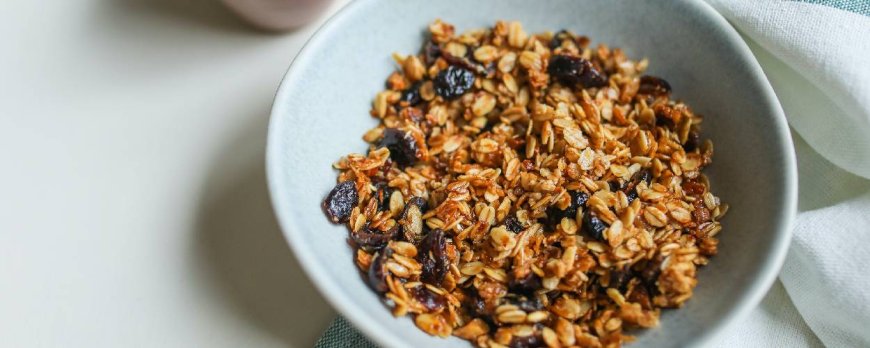How do I start eating healthy?
Embark on your journey to wellness. Find in our article 'How do I start eating healthy?' simple steps to guide you towards a healthier eating lifestyle.

How do I start eating healthy?
Welcome to our article on how to start eating healthy! If you're looking to improve your diet and take a step towards a healthier lifestyle, you've come to the right place.
Key Takeaways:
- Balance the energy consumed with the energy used
- Eat a wide range of foods to ensure a balanced diet
- Consume the right amount of calories for your activity level
- Base your meals on higher fiber starchy carbohydrates
- Include at least one starchy food with each main meal
Why is it important to eat healthy?
Eating healthy plays a vital role in supporting our overall well-being and leading a balanced lifestyle. There are numerous benefits to incorporating healthy eating habits into our lives. Let's explore some of the key reasons to prioritize nutritious food choices:
- Improved physical health: A healthy diet rich in fruits, vegetables, whole grains, and lean proteins provides essential nutrients that promote our physical well-being. It helps maintain a healthy weight, reduces the risk of chronic diseases such as heart disease and diabetes, strengthens the immune system, and boosts energy levels.
- Enhanced mental clarity: A nutritious diet not only fuels our bodies but also supports our brain health. Consuming nutrient-dense foods like leafy greens, oily fish, and berries can improve cognitive function, memory, and concentration, ultimately benefiting our mental clarity and overall brain health.
- Disease prevention: Eating a healthy diet can significantly reduce the risk of developing various chronic illnesses, including certain types of cancer, hypertension, and obesity. By incorporating a diverse range of nutrient-rich foods into our meals, we provide our bodies with the necessary antioxidants, vitamins, and minerals to safeguard our overall health.
- Improved mood and mental well-being: Studies have shown that a healthy diet can positively impact our mood and mental well-being. Consuming foods rich in omega-3 fatty acids, such as fatty fish, avocado, and nuts, can help reduce symptoms of depression and anxiety, promoting better mental health.
By understanding the importance of eating healthy, we can make informed choices that support our well-being and contribute to a healthier lifestyle. It's never too late to start incorporating nutritious foods into our meals and reaping the benefits of a balanced diet.

Balancing Energy Consumption and Usage
Achieving a healthy eating lifestyle begins with finding the right balance between the energy we consume and the energy we use. This balance is crucial for maintaining a healthy weight and overall well-being. Here are some key tips to help you achieve this balance:
- Portion control: Be mindful of serving sizes and avoid consuming larger portions than your body needs. Use smaller plates and bowls to help control portion sizes.
- Calorie management: Understand your daily calorie requirements based on your activity level and aim to consume the right amount of calories to meet your energy needs. This will help you maintain a healthy weight.
- Eat a variety of foods: Include a wide range of foods from different food groups in your diet. Base your meals on higher fiber starchy carbohydrates, such as whole grains, and make sure to include at least one starchy food with each main meal.
- Consume nutrient-rich foods: Opt for nutrient-dense foods that provide essential vitamins, minerals, and antioxidants. Focus on incorporating plenty of fruits, vegetables, lean proteins, and healthy fats into your meals.
Energy Balance and Healthy Habits
To maintain energy balance, it's important not only to monitor your energy intake but also to consider your energy expenditure. Regular physical activity plays a vital role in achieving and maintaining this balance. Engage in activities that you enjoy, whether it's brisk walking, jogging, cycling, or dancing. Aim for a combination of cardiovascular exercise and strength training to reap the benefits of both.
Additionally, staying hydrated is important for overall health and energy balance. Drink enough water throughout the day to keep your body properly hydrated. Water helps regulate your body temperature, aids digestion, and supports numerous bodily functions.
Remember, achieving a balanced energy intake and usage is a gradual process. Start by making small changes to your eating habits and gradually incorporate healthier choices into your diet. By finding the right balance and adopting sustainable habits, you can embark on a journey towards a healthier eating lifestyle.
Building a Balanced and Varied Diet
A key aspect of healthy eating is building a balanced and varied diet that provides our bodies with the essential nutrients they need to function optimally. By including a wide range of foods from different food groups, we can ensure we're getting all the necessary vitamins, minerals, and fiber our bodies require.
Here are some tips to help you create a balanced and varied diet:
- Base your meals on higher fiber starchy carbohydrates such as whole grains, brown rice, and whole wheat pasta. These foods provide sustained energy and help keep you feeling fuller for longer.
- Include at least one portion of starchy food, like potatoes or whole grain bread, with each main meal.
- Eat at least five portions of fruits and vegetables every day. Aim for a variety of colors to ensure you're getting a wide range of vitamins and minerals.
- Incorporate a portion of oily fish, such as salmon or mackerel, into your diet each week. These fish are rich in omega-3 fatty acids, which are beneficial for heart health.
- Reduce your intake of saturated fat by choosing lean sources of protein, such as skinless poultry, legumes, and low-fat dairy products.
- Limit your consumption of added sugars by opting for natural sweeteners like fruits or using spices like cinnamon to add flavor to your meals.
Remember to drink plenty of water throughout the day to stay hydrated and support your body's functions. By following these guidelines and making smart food choices, you can build a balanced and varied diet that promotes overall health and wellbeing.
Reducing Saturated Fat, Sugar, and Salt Intake
To improve our eating habits, it's crucial to reduce our intake of saturated fat, sugar, and salt, which can have negative impacts on our health. Here are some practical tips to help you make healthier choices:
- Focus on real whole foods: Choose fresh fruits, vegetables, lean proteins, and whole grains instead of highly processed foods that are often high in unhealthy fats, added sugars, and sodium.
- Read food labels: Take the time to read the labels of packaged foods and choose those with lower amounts of saturated fat, added sugars, and salt. Be aware of hidden sources of these ingredients, such as sauces, condiments, and processed snacks.
- Swap unhealthy ingredients: Find healthier alternatives to the ingredients you commonly use. For example, replace saturated fats like butter with healthier fats like olive oil or avocado. Use natural sweeteners like honey or fruit puree instead of refined sugar.
- Moderate your intake: While it's important to reduce your intake of saturated fat, sugar, and salt, you don't have to completely eliminate them. Practice moderation by enjoying these foods occasionally and in smaller portions.
By being mindful of your choices and making gradual changes, you can significantly reduce your intake of these harmful substances and improve your overall health and well-being.
Including Carbohydrates and Healthy Fats
Carbohydrates and fats are essential macronutrients that provide energy and support various bodily functions. When choosing your meals, it's important to include both carbohydrates and healthy fats:
- Carbohydrates: Opt for higher-fiber starchy carbohydrates like whole grains, brown rice, quinoa, and sweet potatoes. These provide sustained energy and help you feel full for longer.
- Healthy fats: Include sources of healthy fats in your diet such as avocados, nuts, seeds, and olive oil. These fats are important for brain health, hormone production, and overall well-being.
Remember, a balanced diet should have a good mix of all macronutrients, including carbohydrates, proteins, and fats. By incorporating the right types of carbohydrates and healthy fats into your meals, you can support your body's needs and maintain a healthy eating pattern.

Staying physically active and maintaining a healthy weight
Eating healthy goes hand in hand with staying physically active and maintaining a healthy weight to support overall health and well-being. Incorporating regular exercise into your routine not only helps control weight, but also boosts your mood, improves sleep quality, and reduces the risk of chronic diseases. Aim for at least 150 minutes of moderate-intensity aerobic activity or 75 minutes of vigorous-intensity aerobic activity each week, along with muscle-strengthening activities twice a week.
Exercise is not just about hitting the gym; it can include activities like brisk walking, cycling, dancing, swimming, or even gardening. Find an activity that you enjoy and make it a part of your daily routine. Remember, every bit of movement adds up, so look for opportunities to be active throughout the day, such as taking the stairs instead of the elevator or going for a walk during your lunch break.
Weight management through healthy eating and exercise
- Focus on consuming a balanced diet that includes a variety of nutrient-rich foods. Choose lean proteins, whole grains, fruits, vegetables, and healthy fats.
- Avoid crash diets or extreme calorie-cutting measures, as they can lead to nutrient deficiencies and disrupt your metabolism. Instead, aim for gradual, sustainable weight loss by creating a calorie deficit through a combination of healthy eating and physical activity.
- Keep track of your food intake and exercise using a journal or mobile app to stay accountable and make necessary adjustments to achieve your weight management goals.
- Consult with a healthcare professional or registered dietitian for personalized guidance and support in developing a healthy eating and exercise plan that suits your individual needs.
Remember, maintaining a healthy weight is a lifelong journey, and it's important to approach it with patience, consistency, and self-care. By adopting a balanced diet and incorporating regular physical activity, you can achieve and maintain a healthy weight while promoting your overall well-being.
Incorporating Small Changes and Trying New Foods
Embarking on a journey towards healthier eating doesn't have to be overwhelming; it can start with making small changes and trying new foods. By taking small, manageable steps, you can gradually transform your eating habits and develop a healthier relationship with food. Here are some tips to help you get started:
- Swap unhealthy ingredients for healthier alternatives: Replace processed snacks with fresh fruits, swap sugary drinks for infused water or herbal tea, and choose whole grains over refined grains. Small changes like these can have a significant impact on your overall health.
- Experiment with new recipes and ingredients: Trying new foods can be exciting and open up a whole world of flavors and nutrients. Explore different cuisines, experiment with herbs and spices, and incorporate a variety of colorful fruits and vegetables into your meals.
- Focus on real, whole foods: Avoid highly processed foods that are often loaded with added sugars, unhealthy fats, and artificial ingredients. Instead, opt for whole foods like lean proteins, whole grains, fruits, vegetables, and healthy fats.
Volume eating and portion control:
One strategy to help you feel satisfied while consuming fewer calories is volume eating. This involves choosing foods that have a low calorie density but high volume, such as fruits, vegetables, and leafy greens. By incorporating these foods into your meals, you can increase the overall volume of your plate without adding excessive calories. Additionally, practicing portion control can help you maintain a balanced diet. Be mindful of your serving sizes and listen to your body's hunger and fullness cues.
Remember, the key to long-term success is to make sustainable changes that fit your lifestyle. Gradually incorporate these small changes into your daily routine, and don't be afraid to step out of your comfort zone and try new foods. The journey to healthier eating is an ongoing process, and every small step you take brings you closer to a healthier, more vibrant life.

Considering a plant-based diet
A plant-based diet offers numerous health benefits and can be a great option for those looking to make healthier and more sustainable food choices. By focusing on whole, unprocessed plant foods, such as fruits, vegetables, whole grains, legumes, nuts, and seeds, individuals can enhance their nutrient intake and reduce their consumption of animal products.
Here are some key points to consider when incorporating more plant-based meals into your diet:
- Increase your intake of fruits and vegetables: Aim to include at least 5 portions of fruits and vegetables in your daily meals. These colorful foods are rich in vitamins, minerals, and antioxidants that support overall health and wellbeing.
- Explore plant-based protein sources: Replace meat and poultry with plant-based protein alternatives, such as legumes (beans, lentils, chickpeas), tofu, tempeh, and seitan. These options are not only packed with protein but also contain fiber and other essential nutrients.
- Include whole grains: Opt for whole grain foods like quinoa, brown rice, oats, and whole wheat bread instead of refined grains. Whole grains provide more fiber, vitamins, and minerals, promoting optimal digestion and heart health.
Plant-based diet options:
- Vegetarian: A vegetarian diet excludes meat and fish but includes plant-based foods like fruits, vegetables, grains, legumes, nuts, and seeds. It may include dairy products and eggs depending on personal preferences.
- Vegan: A vegan diet eliminates all animal products, including meat, fish, dairy, eggs, and even honey. It focuses entirely on plant-based foods and may require additional supplementation of vitamin B12.
Remember, adopting a plant-based diet doesn't have to be an all-or-nothing approach. You can start by incorporating more plant-based meals into your routine, gradually reducing your intake of animal products. Experiment with new recipes, explore different flavors, and seek inspiration from plant-based cookbooks and online resources. With time and experience, you'll discover a variety of delicious and nutritious plant-based options that suit your taste buds and support your overall health and wellness.
Mindful Eating and Moderating Intake of Added Sugars and Refined Flour
In our fast-paced world, practicing mindful eating and moderating our consumption of added sugars and refined flour can contribute to a healthier eating lifestyle. Mindful eating involves being fully present during meals, paying attention to our hunger cues, and savoring each bite. By slowing down and being more aware of our food choices, we can make better decisions that support our overall well-being.
One way to practice mindful eating is to limit our intake of added sugars. Added sugars can be found in various processed foods and beverages, contributing to excessive calorie intake and potential health issues. Reading food labels and consciously choosing products with lower sugar content can help us reduce our sugar consumption. Additionally, opting for whole, unprocessed foods instead of those made with refined flour can provide more nutrients and fiber, supporting our digestive health.
When it comes to making healthier choices, it's essential to focus on real, whole foods rather than highly processed options. These nutrient-dense foods, including fruits, vegetables, whole grains, lean proteins, and healthy fats, provide our bodies with essential vitamins, minerals, and antioxidants. By incorporating a variety of foods into our meals and practicing moderation, we can create a balanced and satisfying diet.
Key Points:
- Practicing mindful eating and moderating intake of added sugars and refined flour can lead to a healthier eating lifestyle.
- Choose whole, unprocessed foods over highly processed options to increase nutrient intake.
- Read food labels to identify and limit added sugars in products.
- Focus on a variety of foods, including fruits, vegetables, whole grains, lean proteins, and healthy fats.
- Practice moderation and portion control to maintain a balanced diet.
By incorporating these mindful eating practices into our daily lives, we can make progress towards healthier eating habits. Remember, small changes can lead to significant improvements in our overall well-being. So, let's embrace mindful eating and make conscious choices to nourish our bodies and support a healthier lifestyle.

Making smart food choices and setting yourself up for success
Setting yourself up for success in eating healthy involves making smart food choices, effective grocery shopping, and strategic meal planning and prepping. Here are some tips to help you on your journey:
- Plan your meals: Take some time each week to plan out your meals and create a shopping list. This will help you stay organized and ensure that you have all the ingredients you need for healthy meals.
- Shop the perimeter: When grocery shopping, focus on the fresh produce, lean proteins, and whole grains found around the perimeter of the store. These whole, unprocessed foods are generally healthier options compared to the heavily processed items found in the aisles.
- Meal prep in advance: Spending a few hours each week prepping your meals can save you time and stress during the busy week. Chop up fruits and vegetables, cook proteins, and portion out your meals to have them ready to grab and go.
- Choose nutrient-dense foods: Opt for foods that provide a high amount of nutrients relative to their calorie content. This includes fruits, vegetables, lean proteins, whole grains, and healthy fats. These foods will nourish your body and provide you with sustained energy throughout the day.
- Limit processed foods: Highly processed foods are often high in unhealthy fats, added sugars, and sodium. Try to minimize your consumption of these foods and focus on real, whole foods instead.
- Stay hydrated: Drinking enough water is essential for overall health and can help curb cravings and overeating. Aim to drink at least 8 glasses of water per day, or more if you are physically active.
- Listen to your body: Pay attention to your hunger and fullness cues. Eat when you're hungry and stop when you're full. Remember, it's not just about what you eat, but also how you eat.
By making these smart food choices, implementing effective grocery shopping habits, and planning and prepping your meals strategically, you will be well on your way to achieving healthy eating success.
Conclusion
Congratulations on taking the first step towards a healthier you by exploring how to start eating healthy! Remember, progress comes with persistence, and by implementing these steps, you are well on your way to experiencing the benefits of a balanced and nutritious diet. To start your journey towards healthier eating habits, it is crucial to focus on a few key principles.
Firstly, it's important to balance the energy consumed with the energy used. This means being mindful of portion sizes and managing your calorie intake based on your activity level. Additionally, building a balanced and varied diet is essential. Include a wide range of nutrient-rich foods, such as high-fiber starchy carbohydrates, fruits, vegetables, and oily fish, in your meals to ensure you're getting all the necessary nutrients.
Reducing the intake of saturated fats, sugar, and salt is another critical aspect of eating healthier. Swap out unhealthy ingredients for healthier alternatives, incorporate more whole, unprocessed foods into your diet, and be conscious of the amount of added sugars and refined flour you consume.
Staying physically active, maintaining a healthy weight, and staying hydrated are also key factors in a healthy eating lifestyle. Incorporating small changes, trying new healthy foods, and considering a plant-based diet or incorporating more plant-based meals can bring variety and added health benefits to your diet. Finally, making smart food choices when grocery shopping and meal prepping will set you up for success in your journey towards healthier eating habits.
FAQ
How do I start eating healthy?
To start eating healthy, it is important to balance the energy consumed with the energy used, eat a wide range of foods to ensure a balanced diet, and consume the right amount of calories for your activity level. Base your meals on higher fiber starchy carbohydrates and include at least one starchy food with each main meal. Eat at least 5 portions of fruit and vegetables every day, include a portion of oily fish in your diet, and cut down on saturated fat and sugar. Limit your salt intake, be physically active, maintain a healthy weight, and stay hydrated. Start by making small changes and trying new healthy foods. Focus on real whole foods and limit highly processed foods. Consider adopting a plant-based diet or incorporating more plant-based meals into your diet. Eat a variety of foods and moderate your intake of added sugars and white flour. Consider volume eating, which involves consuming large volumes of low-calorie foods. Include carbohydrates and healthy fats in your meals. Drink enough water and make smart food choices when grocery shopping and meal prepping to set yourself up for success in eating healthy.
Why is it important to eat healthy?
Eating healthy is important because it offers numerous benefits for overall well-being, physical health, mental clarity, and disease prevention. A healthy diet can help maintain a sustainable and balanced lifestyle.
How do I balance energy consumption and usage?
To balance energy consumption and usage, it is important to maintain an energy balance and practice portion control and calorie management to ensure a healthy eating pattern.
How can I build a balanced and varied diet?
Building a balanced and varied diet involves including all food groups, consuming nutrient-rich foods, and incorporating ample fiber, starchy carbohydrates, fruits, vegetables, and oily fish into your daily meals.
How do I reduce saturated fat, sugar, and salt intake?
To reduce saturated fat, sugar, and salt intake, make healthier food choices, swap out unhealthy ingredients, incorporate healthy fats, and cut down on added sugars and excessive salt.
How can I stay physically active and maintain a healthy weight?
Staying physically active and maintaining a healthy weight involves incorporating regular exercise, establishing a sustainable fitness routine, and understanding the relationship between physical activity and healthy weight management.
How can I incorporate small changes and try new foods?
incorporating small changes and trying new foods involves making healthy food swaps, trying new recipes and ingredients, and embracing a mindset of food experimentation to keep things exciting and sustainable.
Should I consider a plant-based diet?
Considering a plant-based diet can offer numerous benefits. It involves adopting a vegetarian or vegan lifestyle or incorporating more plant-based meals into your eating habits. Plant-based protein sources, balanced meal planning, and the environmental and health advantages are important considerations.
How can I practice mindful eating and moderate intake of added sugars and refined flour?
Practice mindful eating by being more aware of eating habits, understanding food labels, and choosing whole, unprocessed foods over highly processed options to moderate the intake of added sugars and refined flour.
How can I make smart food choices and set myself up for success?
Make smart food choices by following grocery shopping tips, meal prepping strategies, and meal planning techniques. Being prepared and organized sets you up for success in eating healthy.

































































































































